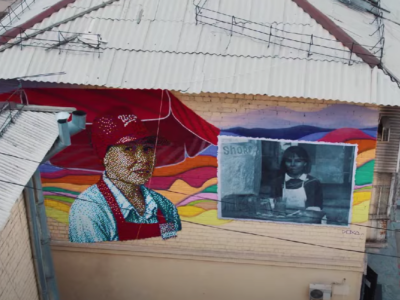In Vladikavkaz, the capital of Russia's North Ossetia, LJ user alan-tskhurbaev ran into a stencil graffiti, whose message (RUS) seemed somewhat unlikely for this North Caucasian region:
Kosovo is Serbia!
Referring to Georgia‘s breakaway region of South Ossetia, whose leaders regard Kosovo independence as a precedent, Oleg Panfilov – LJ user oleg_panfilov, director of the Center for Journalism in Extreme Situations – posted this comment (RUS):
Wasn't there a second part – “South Ossetia is Georgia”?
LJ user alan_tskhurbaev replied (RUS):
Since the question is addressed to me and not to the author of the graffiti, I'll express my own opinion – South Ossetia is not Georgia even more than Kosovo is not Serbia. And here [in North Ossetia], you don't have to write it on the buildings – everyone knows it anyway.
***
Paris-based LJ user sebtinos stumbled upon a history textbook published by the Center for Democracy and Reconciliation in Southeast Europe (CDRSEE): “A textbook that teaches peace,” he described it. Below are some of his thoughts (RUS) on the project:
[…] Sixteen historians from various corners of the Balkans have developed the region's joint history textbook.
The essence is simple. Albanian history textbooks teach that if all other peoples disappear from the earth, Albanian nation will continue to flourish. In Greece, high school students are being taught that “the fall of Constantinople” took place in 1453, while their Turkish counterparts learn about the “liberation of Istanbul.” Students from Skopje, Belgrade and Sofia get to know the history of the “liberation from the Turkish yoke,” while in Ankara they study the “dramatic and unfair war that put an end to the Great Ottoman Empire.”
Indeed, there are as many versions of the Balkan history as there are nations living in this region. Each group is searching through history to find explanations of the present and arguments in favor of the national idea. Kosovo believes it has historical arguments to support its independence. Belgrade is convinced of the opposite. Today, every nation has its own view of the past and isn't really concerned with finding ways to co-exist in the present.
[…]
And it has occurred to me … that, perhaps, the former Soviet republics should stop […] re-writing history separately and finally publish something jointly.
In response to a reader, LJ user sebtinos added:
I had a chance to attend schools in four different countries: USSR, Russia, Ukraine and France. The views differ completely. It's not fair that the humankind has one universal history, but nations or individuals [do not share a common view on it.]
LJ user sebtinos also crossposted his history textbook entry to the ru_politics LJ community, and below are two reader responses (RUS):
kabashek:
Joint history is not good for the powerful elites [of each nation]. Makes it harder to manipulate [the population]. And the example you're citing is funded by the EU, not by Albania and Turkey.
***
stepanov_karel:
I, of course, haven't read this textbook, but I suspect that it's written [in an extremely appeasing manner]. That is, all controversial topics are simply ignored.
All controversial topics have to be thoroughly discussed, however.







6 comments
COMPLAINT
Global Voices lists Kosovo as a country.
It’s nothing of the sort.
UNSCR 1244 recognizes it as a continued part of Serbia. Meantime, a foreign presence continues to hold much of the real power in Kosovo.
Seeing how Kosvo is incorrectkly listed as a country, why doesn’t GV list Pridnestrovie (Trans-Dniester) South Ossetia and Abkhazia as countries?
Michael Averko,
Global Voices uses the Wikipedia country list as a guide for how to sort our content. It includes territories, dependencies, and what many people consider countries. How we sort our content on the website is not a reflection of the political views of our authors or editors. As you can see on the Wikipedia page there are lots of disputes about many places around the world.
http://en.wikipedia.org/wiki/List_of_countries
That’s a poor answer.
Kosovo isn’t in the UN, IOC or IMF.
Moreover, some of the disputed former Communist bloc territories I mentiomed have either just as good an independence claim or better than Kosovo. In comparison to Kosovo, all of those other mentioned former Communist bloc territories have governments which are more in control of their respective land.
Many an academic and non-academic will corrdecetly tell you that Wiki shouldn’t always be counteed on as a good source of information.
This particular matter is one such example.
EDIT of prior submission.
Also, I forgot to mention Nagorno Karabakh in my initial post at this thread. Pardon the misspell in it.
That’s a poor answer.
Kosovo isn’t in the UN, IOC or IMF.
Moreover, some of the disputed former Communist bloc territories I mentiomed have either just as good an independence claim or better than Kosovo. In comparison to Kosovo, all of those other mentioned former Communist bloc territories have governments which are more in control of their respective land.
Many an academic and non-academic will correctly inform you that Wiki shouldn’t always be counted on as a good source of information.
This particular matter is one such example.
BTW, according to that link and Jeremy’s explanation (see the first link in this email), the four mentioned disputed former Soviet territories should also be listed as countries.
Kosovo is Serbia ! UN SC 1244 !